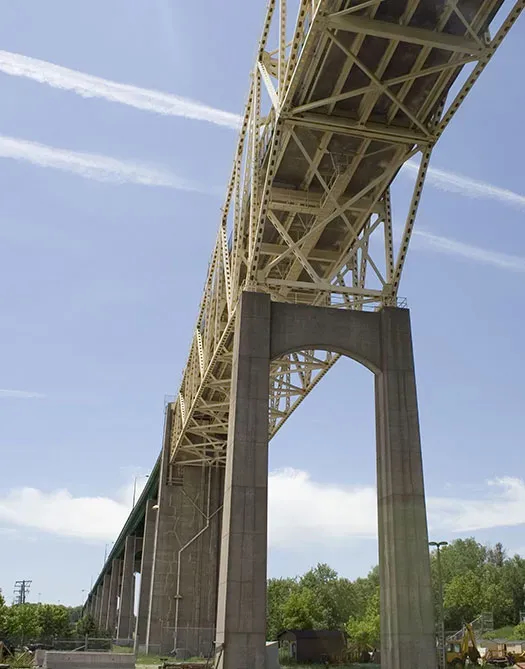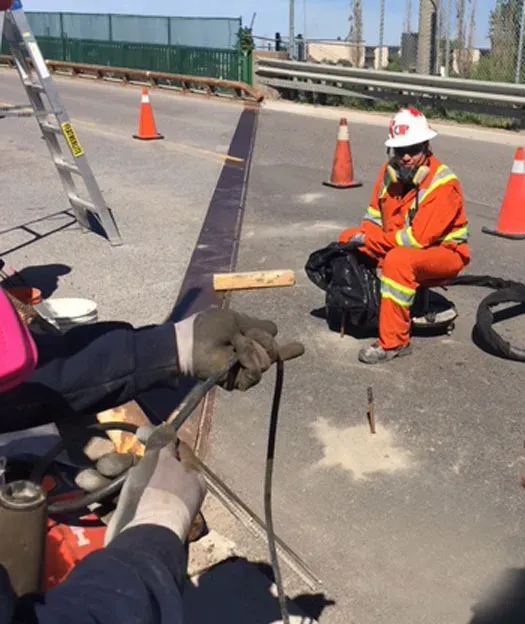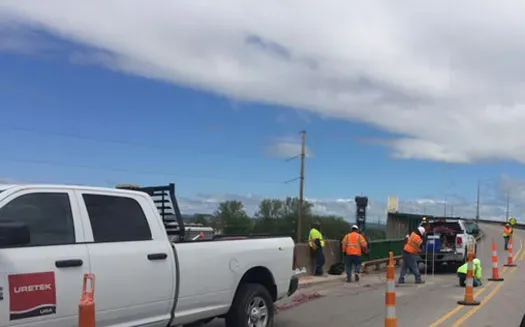International Bridge Repair Using URETEK Deep Injection®
Problem
The Sault Sainte Marie International Bridge is a 2.8-mile bridge built in the early 1960s that connects the twin cities of Sault Sainte Marie in Michigan and Ontario. The bridge is operated by the International Bridge Administration (IBA), and the IBA scheduled repairs for the aging structure in the summer of 2018. One area of focus was the bridge’s abutments. “The best description is that the abutments were slowly ‘leaking’ sand,” said IBA General Manager Peter Petainen. This “leak” was a result of the natural settling of soils in and around the abutments over the bridge’s lifetime, and while not unexpected considering the bridge’s age, the IBA decided to perform repairs on the abutments to prevent the situation from worsening. They hired URETEK and Poly-Mor Canada to complete the repairs.
Analysis
Because the IBA was scheduling several maintenance/repair projects for the summer of 2018, it was important that the abutment repairs were both cost-effective and logistically feasible. A more traditional, structurally intrusive repair would have been very costly and would have greatly disrupted traffic on an essential international thoroughfare. For these reasons, the IBA decided to pursue a more innovative repair strategy with the URETEK Deep Injection® (UDI) process.
Solution
Both URETEK and Poly-Mor Canada used a series of polyurethane injections applied from the top of the bridge to stabilize sub-surface sand, gravel, and rocks in and around the abutments. The quick-setting epoxy was injected as a liquid into the soils, where it cured in about an hour to enhance soil strength. Injections on the American side were performed at two levels while the Canadian side required three levels of injections.
Result
Both sides of the bridge repairs were completed in only two days. The IBA was very satisfied because the repairs were under budget, minimally invasive, and not only were they completed on time, but the bridge remained open for cross-traffic all throughout the repair process and the project was successfully completed prior to tourist season. Additionally, the work was completed at only a fraction of the cost of alternative repair methods. URETEK’s repairs cost the IBA approximately 1% of the estimated cost of a full reconstruction to the abutments.
URETEK Deep Injection® (UDI)
Widely referenced throughout our industry, UDI involves the injection of structural polymer into base and subgrade soils to increase the load bearing capacity. This is achieved by injecting the polymer through small holes drilled directly through the pavement structure to depths determined by site-specific analysis. Our URETEK 486 Star® material flows easily into voids and weak zones within the soil mass below. Through a controlled chemical reaction, the expanding polymer compacts surrounding soils and applies a controlled pressure on targeted areas of the affected pavement above. If needed, a multi-injection design plan is utilized to gently return the pavement to its original grade. The composite material quickly cures into a strong, dimensionally stable, and water-resistant geo-material, providing years of reliable service.
URETEK 486 Star®
URETEK 486 Star® polymer is a two-component, high-density, expanding thermoset polyurethane system. It was developed to be the ideal solution for under-sealing, void filling, lifting of settled pavement, stabilization and stiffening of weak soils, and for encapsulating and sealing buried infrastructure. URETEK 486 Star® is environmentally inert, non-toxic, and resists underground water erosion or weakening due to its industry-leading hydrophobic properties.


